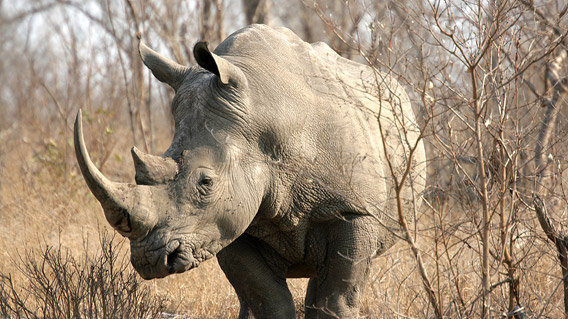
Rhinoceros, Kruger National Park, South Africa. A white rhinoceros (Ceratotherium simum) in South Africa. Photo by: Bigstock.
Last year nearly 450 rhinos were killed for their horns in South Africa, which has become the epicenter for the global rhino poaching epidemic. Rhinos are dying to feed rising demand for rhino horn in Asia, which is ground up and sold as traditional Chinese medicine, even though scientific studies have shown that rhino horn has no medicinal benefit. Now, two organizations, the African Wildlife Foundation (AWF) and Wildaid have announced a partnership to move beyond anti-poaching efforts and target rhino horn consumption in China.
“While real efforts are being made on the ground to halt the poaching, we also need to reach out to those who buy the horn and show them the damaging effects of their actions. This partnership leverages African Wildlife Foundation’s expertise around rhino conservation and WildAid’s network and experience operating in Asia to put an end to the demand for rhino horn,” Patrick Bergin, head of AWF, said in a press release.
AWF and Wildaid are planning a set of public service announcements with well-known Chinese figures in order to raise awareness about the rhino poaching crisis and link it directly to the booming illegal trade in rhino horn in the country. The campaign also plans to reach out to Chinese living and working in Africa.
All of the world’s five rhino species are considered threatened, with three of the five listed by the IUCN Red List as Critically Endangered. But the illegal rhino horn trade has not only decimated rhino populations, but comes with a human toll as well. Poachers have been killed in the act, while wildlife rangers have lost their lives protecting rhinos.
Related articles
How a crippled rhino may save a species
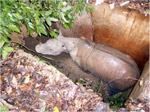
(04/09/2012) On December 18th, 2011, a female Sumatran rhino took a sudden plunge. Falling into a manmade pit trap, the rhino may have feared momentarily that her end had come, but vegetation cushioned her fall and the men that found her were keen on saving her, not killing her. Little did she know that conservationists had monitored her since 2006, and for her trappers this moment had been the culmination of years of planning and hope. A few days later she was being airlifted by helicopter to a new home. Puntung, as she has become called, was about to enter a new chapter in her life, one that hopefully will bring about a happy ending for her species.
Kruger National Park loses 95 rhinos to poachers in three months
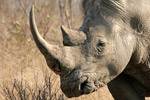
(04/05/2012) Since the first of the year, South Africa’s Kruger National Park has lost 95 rhinos to poachers, reports the blog Rhino Horn is NOT Medicine. South Africa, and Kruger National Park in particular, continue to be the epicenter for rhino poaching worldwide. South Africa has lost 159 rhinos in total this year with Kruger bearing nearly 60 percent of the fatalities.
Feds bust rhino horn traffickers
(02/23/2012) Federal agents from the U.S. Fish and Wildlife Service (FWS) and U.S. Immigration and Customs Enforcement (ICE) arrested seven people on charges of trafficking endangered rhino horn in the United States, reports the Department of Justice and Department of the Interior. The arrests were made in Los Angeles, Newark, and New York.
Sumatran rhino pregnant: conservationists hope third time’s the charm
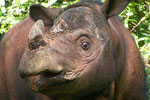
(02/07/2012) Ratu, a female Sumatra rhino (Dicerorhinus sumatrensis), is in the eleventh month of her third pregnancy raising hopes for a successful birth of one of the world’s most imperiled big mammals. Ratu suffered two prior miscarriages, but researchers believe the current pregnancy—which still has four to five months to go (for a total term of around 15-16 months)—could produce what Indonesian officials have long hoped for: a bundle of joy at the Sumatran Rhino Sanctuary in Sumatra. With only around 200 Sumatran rhinos surviving today in Indonesia and Bornean Malaysia, many conservationists see such breeding efforts as the last and best chance to save the Critically Endangered species from extinction.
Happy rhino news: no rhinos poached in Nepal last year
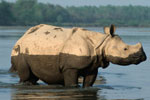
(01/10/2012) As rhinos again fell to poachers in record numbers in 2011, there was one bright-spot: Nepal. Not a single rhino was killed by poachers in the Himalayan nation, home to an estimated 534 greater one-horned rhinos (Rhinoceros unicornis), categorized as Vulnerable by the IUCN Red List. Conservationists celebrated at Chitwan National Park, which holds the vast majority of the country’s rhinos.







